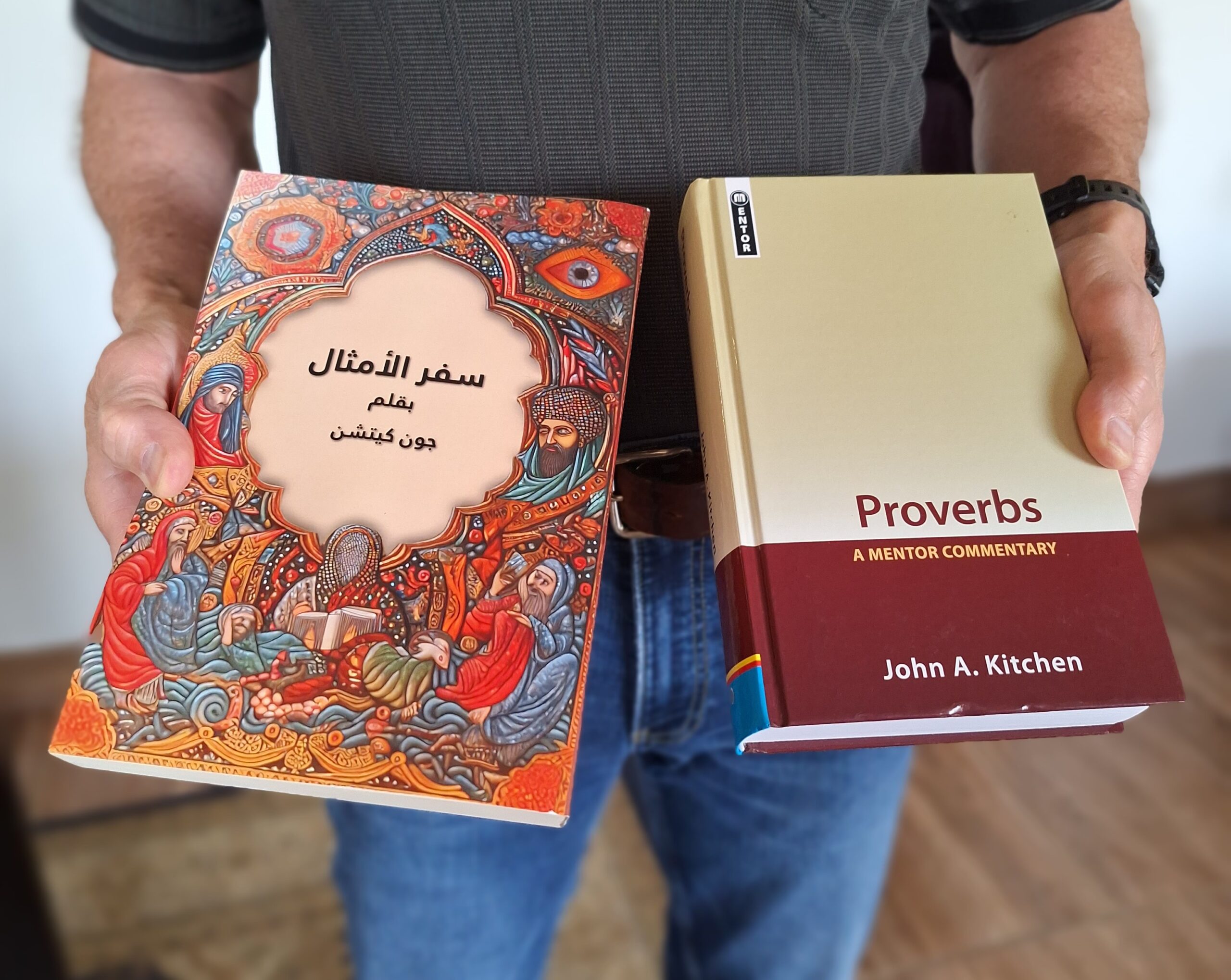I recently received word that my Proverbs: A Mentor Commentary was just published in the Arabic language. I’m told that three thousand copies were printed. Currently, 70 Arabic-speaking students are using it as their textbook in their seminary course on Proverbs. Pray with me that God will be glorified in each student and reader of the commentary–that a new fear of the Lord and knowledge of God will lay the foundation for a lifetime of walking in wisdom (Proverbs 9:10).
Category: Proverbs (Page 1 of 4)
I’m delighted to hold in my hands a copy of the Arabic translation of my Proverbs: A Mentor Commentary.
My gratitude to Dr. David Martin for first catching the vision for this and for overseeing its translation.
May God use it to the eternal good of many and to His glory in all things.
See the previous posts in this series here, here, here, here, and here.
Approaching the conclusion of our reflections, let’s recap. You desire success? You’ll need wisdom. To have wisdom, you’ll have to embrace the fear of the Lord. You’ll never embrace the fear of the Lord apart from God’s revelation of Himself to us, supremely in Jesus as held before us in the pages of the Bible.
We come then to the third movement in the fear of the Lord. The fear of the Lord is evidenced by obedience to God.
How do I know whether I fear the Lord? There’s only one answer: Am I currently walking in obedience to God?
How do I know if someone else (maybe someone I love deeply) fears the Lord? Same answer – are they walking in obedience to God?
The Bible underscores this repeatedly. Here are just a few samples:
- “The fear of the LORD is hatred of evil.” (Proverbs 8:13a)
- “… by the fear of the LORD one turns away from evil.” (Proverbs 16:6b)
- “Let not your heart envy sinners, but continue in the fear of the LORD all the day.” (Proverbs 23:17)
The evidence of whether one fears the Lord is not how passionate one feels during corporate worship, how much passion arises within one over certain issues, nor how many Bible verses one can quote. There is only one test – obedience to God.
If you obey God’s Word, you fear Him. If you, at any point, do not obey God’s Word, at that point you fear something or someone more than your fear the Lord. That thing is your god, whatever else you may say.
In C.S. Lewis’s masterpieces known as The Chronicles of Narnia there is a passage in the opening book that sets before us this matter of the fear of the Lord.
In the account the children Lucy, Susan, and Edmund have entered into the make believe world of Narnia. Mr. and Mrs. Beaver were showing them about and have begun to tell them of Aslan. He is a mighty lion, who represents the figure of Christ in the story. They described Aslan’s might, power, wisdom, and awesome presence. Yet the children did not seem to grasp who he was. Finally Mr. Beaver said, “You’ll understand when you see him.”
“But shall we see him?,” asked Susan.
“Why, Daughter of Eve, that’s what I brought you here for. I’m to lead you to where you shall meet him,” said Mr. Beaver.
“Is, is he a man?”, asked Lucy?
“Aslan a man!” said Mr. Beaver sternly. “Certainly, not. I tell you he is the King of the wood and the son of the great Emperor-Beyond-the-Sea. Don’t you know who is the King of Beasts? Aslan is a lion—the Lion, the great Lion.”
“Ooh!” said Susan, “I’d thought he was a man. Is he—quiet safe? I shall feel rather nervous about meeting a lion.”
“That you will dearie, and make no mistake,” said Mrs. Beaver. “If there’s anyone who can appear before Aslan without their knees knocking, they’re either braver than most or else just silly.”
“Then he isn’t safe?,” said Lucy.
“Safe?” said Mr. Beaver. “Don’t you hear what Mrs. Beaver tells you? Who said anything about safe ‘Course he isn’t safe. But he’s good.”
Therein lies the heart of the matter. The fear of the Lord is not the opposite of love for God. The fear of the Lord is love in full blossom. And love for God is the fear of the Lord at its designed zenith.
See the previous posts in this series here, here, here, and here.
Let me pause to ask, are you hung up on the word “fear”? Someone may object, “Doesn’t the Bible say ‘Perfect love casts out fear’?” It does. In 1 John 4:18. Love casts out that servile, ugly, deadening fear that follows close on the heels of sin and independence. But loving God and fearing God are not mutually exclusive. In fact, they are one.
How can that be?
Did you know that the Crayola Crayon Company manufactures twenty-three varieties of red crayons? All are crayons. All are red. But each one is a progressively different hue of that one color.
Did you know there are progressive hues of the fear of the Lord?
Ed Welch has written helpfully on this theme. He sets out the fear of the Lord as a continuum. Consider with me, in the light of God’s revelation of Himself to us, the appropriateness of each hue of the fear of the Lord set out in this way.
Consider with me, in the light of God’s revelation of Himself to us, the appropriateness of each hue of the fear of the Lord set out in this way.
God is utterly holy. Holy, at its root, speaks of otherness. God is over, beyond, higher, deeper, wider, and different than anything we can imagine. Indeed, our imagination cannot take in all that God is in His holiness. He is righteous in the most absolute sense. By the way, I am not. And neither are you. “God is a consuming fire” (Deut. 4:24; Heb. 12:29). Terror is not inappropriate.
Not only is God holy, righteous, and a consuming fire, He possesses infinite power. He cannot be resisted. Dread is not an inappropriate response.
This God—holy, righteous, consuming, all-powerful—holds “In his hand … the life of every living thing and the breath of all mankind” (Job 12:10). This God holds my next breath and heartbeat. He dispenses them to me at His pleasure. He will one day withhold them in His wisdom. I am at His mercy. Each moment I remain animate and alive, is a gift from His hand. Trembling before Him is not an inappropriate response.
The great marvel is that this God continues to dispense to me breaths, heartbeats, and brainwaves. Why? Each morning my eyes open to a new day—why? Each time I set down to a meal—why? In God’s kindness He continues to drop breadcrumbs of grace along my path. We discover that “God’s kindness is meant to lead you to repentance” (Romans 2:4). Astonishment is appropriate.
But more astonishing yet is the discovery that before I ever existed (indeed, before anything but God existed), God set His love on me. He did so not because I am holy, for I am not. He did so not because I am righteous, because I am not. He knew ahead of time that I would prove unholy and unrighteous. Yet then and there He determined He would deal with me according to His love. He set His love on me not because of something in me, but because of something in Himself. God set things up so that the ground of His love for me would never be in my performance, but in His person. He remains holy, righteous, and a consuming fire and yet in all of that He is love. Awe would be a good word to describe the response of one who is beginning to see.
So much so did God determine to deal with me in His love that “at the right time” (Romans 5:6) He stepped into time and space in a human body and with a sinless human nature in the person of Jesus. He came, He said, to seek and to save what was lost. That was me. He secured me to His Father forever by dying my death and becoming my life. Such sacrificial love calls forth reverence within us.
All this God did “so that in the coming ages he might show the immeasurable riches of his grace in kindness to us in Christ” (Ephesians 2:7). Who would not yield to and commit themselves to one so powerful and yet so determined to deal with us in grace? Yes, complete devotion is the right response.
Indeed, in view of God’s mercies to us in Jesus, we offer up our bodies to Him as living sacrifices (Romans 12:2). Trust is the inevitable extension in our growing relationship to this God.
This life of trusting obedience becomes our “reasonable service” of worship (Romans 12:2) before one so utterly holy, completely righteous, committedly loving, and enduringly gracious.
Love of God and fear of the Lord are not mutually exclusive. In fact, the more we know the Lord, the deeper we move into relationship with Him in both fear and love.




